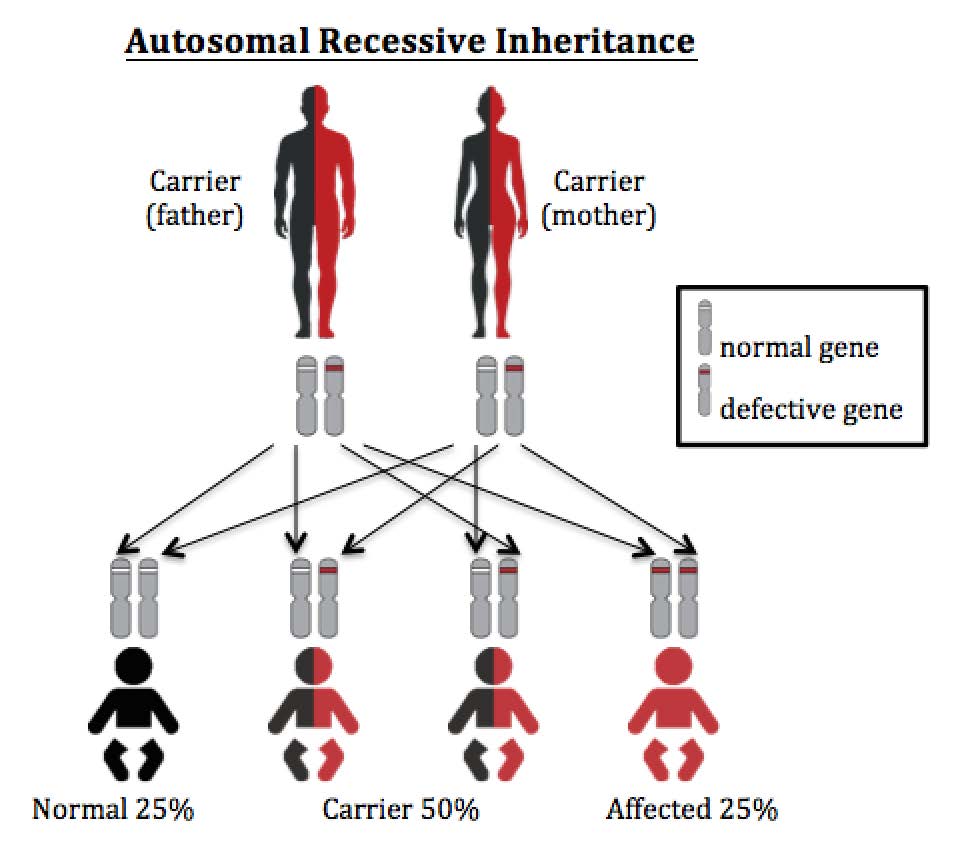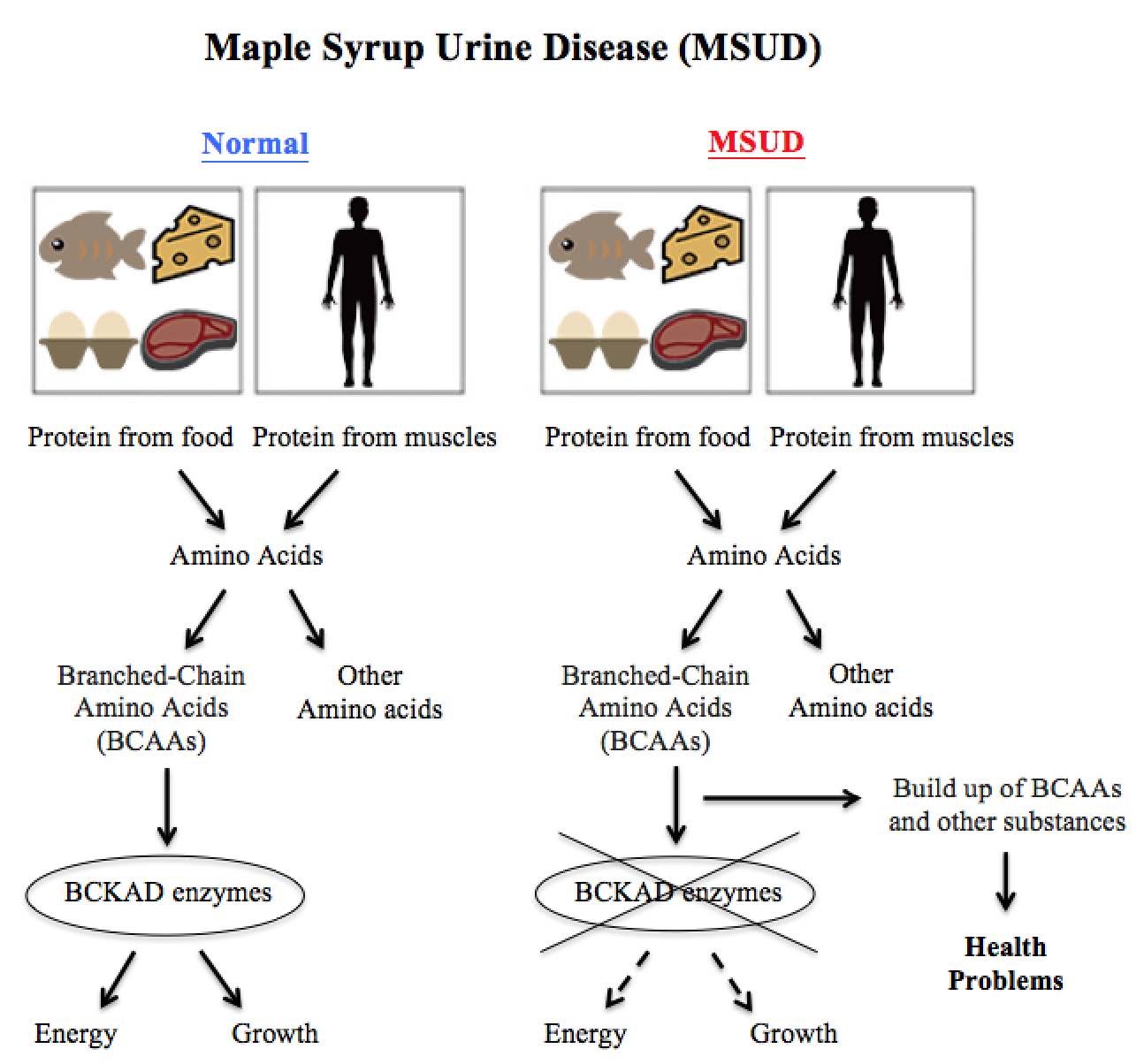
MSUD is a rare but treatable amino acid disorder. People with amino acid disorders cannot process amino acids, the building blocks of protein.
Our body breaks down protein in food into amino acids when we eat, and breaks down protein in our muscle into amino acids during prolonged fasting and stress. Amino acids are then processed by special chemicals called enzymes so that the body can use them. Different enzymes target specifically at different amino acids.
Babies with MSUD lack an enzyme called "branch-chain alpha-ketoacid dehydrogenase" (BCKAD), which is essential to break down three branched-chain amino acids, namely leucine, isoleucine and valine. Therefore, these three amino acids cannot be utilized and harmful substances build up in the body, causing health problems. The accumulated metabolites also give babies a characteristic of maple syrup like smell in their urine and sweat.

The original graphic is converted into the following text version for your easy access to the information.
Maple Syrup Urine Disease (MSUD)
Our body breaks down protein in food into amino acids when we eat, and breaks down protein in our muscles into amino acids during prolonged fasting and stress. When functioning normally, our body will produce branch-chain alpha-ketoacid dehydrogenase (BCKAD) to metabolise branched-chain amino acids (leucine, isoleucine and valine) in order to produce energy for our body's use and growth. In people with MSUD, BCKAD is either missing or not working properly, hence affecting energy supply and growth. As a result, branched-chain amino acids and other harmful substances will build up in the body and cause serious health problems.
Everybody has two copies of genes, one from each parent, which tell the body how to make specific enzymes.
MSUD is an autosomal recessive disease. Only when babies inherit two faulty copies of the gene for MSUD from parents, the enzyme made does not work properly or is not even made at all.

The original graphic is converted in to the following text version for your easy access to the information.
Autosomal recessive inheritance
In autosomal recessive diseases, people with two faulty copies of gene (one from father and one from mother) will develop symptoms. People with only one faulty copy of gene are normal and they are called disease carriers. MSUD is inherited in autosomal recessive manner.
If both parents are MSUD carriers, for each pregnancy (no matter it is a baby boy or girl), there is a 25% (1 in 4) chance that the child has 2 copies of normal (who is not affected), a 50% (1 in 2) chance that the child has one normal and one faulty gene who is a carrier like the parents, and a 25% (1 in 4) chance that the child has two copies of faulty gene who is at risk for MSUD.
Babies with MSUD are usually healthy at birth but they can develop metabolic crisis within the first few days of life due to the build-up of toxic substances in the body.
Metabolic crisis is a period of time when a metabolic disorder makes the baby seriously ill. Babies tend to develop metabolic crisis when they do not have food for long periods of time or when they have infection, fever or stomach upset. Left untreated, they deteriorate with seizure and coma which can be life threatening.
Symptoms vary from person to person. Some children have very mild or no symptom and do not develop symptoms of metabolic crisis until they are older.
MSUD can be treated with special diet and supplements to avoid accumulation of toxic substances in the body. Dietary treatment should start as early as possible and continue throughout the life.
High protein foods including milk (both breast milk and normal infant formula) are given in a limited amount. The rest of protein is supplied by a special nutritionally balanced infant formula which is free from leucine, isoleucine and valine. Sometimes isoleucine and valine supplement might also be needed. Such diet aims at providing the three amino acids just right for normal growth, development and health.
Patients with MSUD need to see their specialist metabolic team regularly even when they do not have symptom. They need to have regular monitoring of their nutritional status and amino acid levels in the blood. The metabolic team will adjust the diet accordingly.
Discuss with your doctor and dietician beforehand to provide a specific care plan during illness or other times when your child loses appetite in order to prevent a metabolic crisis.
If you are worried that your baby is ill, it is important to follow medical advice. Bring your baby to your local accident and emergency department immediately. When you are going to the hospital, take the prescribed medicine, special infant formula and any information that you have been given about MSUD, including this pamphlet, to the hospital with you.
For general queries on Newborn Screening Programme for Inborn Errors of Metabolism, please call 5741 4280 (Department of Clinical Genetics, Hospital Authority)
July 2024
Hospital Authority